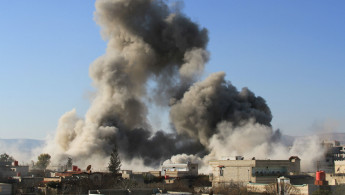Opposition accuses Syrian regime of using napalm against civilians
Opposition accuses Syrian regime of using napalm against civilians
Analysis: Damascus has been accused of using napalm to attack Daraya, as President Assad faces increasing military pressure.
2 min read
Daraya has seen heavy fighting throughout the war [AFP]
The Syrian opposition has accused President Bashal al-Assad's regime of dropping napalm on a town near Damascus on the afternoon of August 11.
Syrian civil defence volunteers said forces allied to the president dropped four barrel bombs of napalm on Daraya.
The bombs reportedly caused immense fires that took hours to get under control.
Daraya has been the site of heavy fighting since the Syrian civil war began. It saw early anti-government protests and fell to the Nusra Front in 2012.
The town was retaken twice by pro-government forces, but since summer 2013 it has been controlled by armed opposition forces and besieged by the regime.
Hamish de Bretton-Gordo, a former commanding officer of the UK Chemical, Biological, Radiological and Nuclear (CBRN) regiment and Nato's Rapid Reaction CBRN battalion, said the footage appeared consistent with the aftermath of napalm attacks, reported UK-based newspaper The Guardian.
"It is likely that it is napalm. Napalm seems to fit the bill," he said.
First used in World War II, napalm is a flammable liquid that sticks to human skin. There is no practical way to remove it, and it can cause severe burns, asphyxiation, unconsciousness and death.
Its use against areas with civilian populations was banned by the UN Convention on Certain Conventional Weapons in 1980.
This is not the first time napalm has allegedly been used in the war. In 2012, a BBC crew in Aleppo province reported what they described as a "napalm-like" attack on a school.
The accusation comes a week after the US and Russia reached agreement on a draft UN resolution aimed at identifying those behind chemical weapons attacks in Syria.
De Bretton-Gordon said the attack may have been due to the increasing military pressure facing the regime in reaction to last weeks draft resolution. The opposition could also be exploiting the diplomatic wrangling to put psychological pressure on the regime.
Mary Wareham, advocacy director for Human Rights Watch's arms division, tweeted that the fire seen in the video suggested that Assad's forces had used an incendiary device.
Syrian civil defence volunteers said forces allied to the president dropped four barrel bombs of napalm on Daraya.
The bombs reportedly caused immense fires that took hours to get under control.
Daraya has been the site of heavy fighting since the Syrian civil war began. It saw early anti-government protests and fell to the Nusra Front in 2012.
The town was retaken twice by pro-government forces, but since summer 2013 it has been controlled by armed opposition forces and besieged by the regime.
| This is not the first time napalm has allegedly been used in the war. |
Hamish de Bretton-Gordo, a former commanding officer of the UK Chemical, Biological, Radiological and Nuclear (CBRN) regiment and Nato's Rapid Reaction CBRN battalion, said the footage appeared consistent with the aftermath of napalm attacks, reported UK-based newspaper The Guardian.
"It is likely that it is napalm. Napalm seems to fit the bill," he said.
First used in World War II, napalm is a flammable liquid that sticks to human skin. There is no practical way to remove it, and it can cause severe burns, asphyxiation, unconsciousness and death.
Its use against areas with civilian populations was banned by the UN Convention on Certain Conventional Weapons in 1980.
This is not the first time napalm has allegedly been used in the war. In 2012, a BBC crew in Aleppo province reported what they described as a "napalm-like" attack on a school.
The accusation comes a week after the US and Russia reached agreement on a draft UN resolution aimed at identifying those behind chemical weapons attacks in Syria.
De Bretton-Gordon said the attack may have been due to the increasing military pressure facing the regime in reaction to last weeks draft resolution. The opposition could also be exploiting the diplomatic wrangling to put psychological pressure on the regime.
Mary Wareham, advocacy director for Human Rights Watch's arms division, tweeted that the fire seen in the video suggested that Assad's forces had used an incendiary device.
|
— Mary Wareham (@marywareham) August 11, 2015" style="color:#fff;" class="twitter-post-link" target="_blank">Twitter Post
">
|



